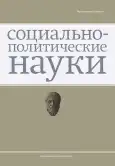On the Issue of Mediatization of Education
- Авторлар: Kerimov A.A.1, Shebzukhova F.A.2, Ebzeev A.A.3
-
Мекемелер:
- Ural Federal University named after B.N. Yeltsin
- Karachay-Cherkess Republican Institute of Advanced Training of Education Workers
- State University of Management
- Шығарылым: Том 12, № 5 (2022)
- Беттер: 40-46
- Бөлім: Articles
- URL: https://bakhtiniada.ru/2223-0092/article/view/147010
- DOI: https://doi.org/10.33693/2223-0092-2022-12-5-40-46
- ID: 147010
Дәйексөз келтіру
Аннотация
Негізгі сөздер
Толық мәтін
##article.viewOnOriginalSite##Авторлар туралы
Alexander Kerimov
Ural Federal University named after B.N. Yeltsin
Email: kerimov68@mail.ru
Dr. Sci. (Polit.), Associate Professor; Professor at the Department of Political Sciences Yekaterinburg, Russian Federation
Fatima Shebzukhova
Karachay-Cherkess Republican Institute of Advanced Training of Education Workers
Email: fatima1956@list.ru
Dr. Sci. (Philos.), Professor; Head at the Department of History, Social Studies and Political Science Cherkessk, Russian Federation
Akhmat Ebzeev
State University of Management
Email: ebze1@yandex.ru
Dr. Sci. (Polit.), Associate Professor; Vice-Rector Moscow, Russian Federation
Әдебиет тізімі
- Kerimov A.A. Educational potential of social media in the context of the formation of legal culture in modern Russia. Izvestiya UrFU. Series 1: Problems of Education, Science and Culture. 2021. No. 4 (27). Pp. 219-228. (In Rus.)
- Muller V.K., Dashevskaya V.L., Kaplan V.A. et al. New English-Russian dictionary. Moscow: Rus. yaz. 1994. 880 p.
- Gureeva A.N. Theoretical understanding of mediatization in the digital environment. Bulletin of the Moscow University. Episode 10: Journalism. 2016. No. 6. Pp. 192-208. (In Rus.)
- Thompson J.B. The media and modernity. A social theory of the media. Cambridge, 1995 [Electronic resource]. URL: https://johnpostill.com/2010/03/30/communication-and-social- context-thompson-1995/
- Krotz F. Mediatization: A concept with which to grasp media and societal change. In: Mediatization: Concept, changes, consequences. K. Lundby (ed.). New York: Peter Lang, 2009 [Electronic resource]. URL: https://johnpostill.com/2010/03/01/notes-on-krotz-2009- mediatization/
- Hjarvard S. The mediatization of religion: A theory of the media as agents of religious change. In: Northern lights: Yearbook of film & media studies. Bristol: Intellect Press, 2008 [Electronic resource]. URL: https://www.researchgate.net/publication/233605968_The_mediatization_of_religion_A_theory_of_the_media_as_agents_of_religious_change/
- Rogozina I.V. Media picture of the world: Cognitive-semiotic aspect: Dis. ... Dr. Sci. (Philol.). 10.02.19. Barnaul, 2003. 430 p.
- Fedorov A.V., Levitskaya A.A., Chelysheva I.V. et al. Mass media education in the CIS countries. Moscow: OD “Information for all”, 2020. 273 p.
- Media education. Paris: UNESCO, 2002. 146 p.
- Fedorov A. Media education around the world: Brief history. 2008 [Electronic resource]. URL: https://www.researchgate.net/publication/26595210_Media_Education_around_the_World_Brief_History
- Karelin V.M. Mediatization of education: from innovation to reformatting. In: Trends in the development of education: Teacher, educational organization, society - 2019: Materials of the All-Russian Scientific and Practical Conference with international plot. Cheboksary: Publishing house “Wednesday”, 2019. Pp. 20-23.
- Bobrova O.A. The use of ICT technologies in mathematics lessons. In: Trends in the development of education: Teacher, educational organization, society - 2019: Materials of the All-Russian Scientific and Practical Conference with international plot. Cheboksary: Publishing house “Wednesday”, 2019. Pp. 12-16.
- Fedorov A. Modern media education models. Acta Didactica Napocensia. 2011. No. 1. Vol. 4. Pp. 73-82. (In Rus.)
- Roshchina Y.M. Demand for mass open online courses (MOOC) experience of Russian education. Education Issues. 2018. No. 1. Pp. 174-199. (In Rus.)
- Ubaeva V.V. Information technologies in education: Mass open online courses. Bulletin of Science and Education. 2018. No. 4. Pp. 105-108. (In Rus.)
- Khmelenko V.V. Transformation of education in the era of information technologies: The role of mass open online courses. Bulletin of Science and Education. 2016. No. 7. Pp. 57-59. (In Rus.)
- Arpentyeva M.R. Mediatization of education: Problems of destruction of relations in the system “Teacher-student”. Sign: Problematic Field of Media Education. 2017. No. 1. Pp. 7-17. (In Rus.)
- Ignatovsky A.D., Radkov A.A. Cybernetic terrorism as a threat to the security of society. Culture. Spirituality. Society. 2014. No. 12. Pp. 66-71. (In Rus.)
- Gerasimova E. Trends of the year in education: Much of the new will be very unconventional for our school. Novaya Gazeta. 14.01.2014. (In Rus.) [Electronic resource]. URL: https://www.ng.ru/education/2014-01-14/8_trends.html
Қосымша файлдар








